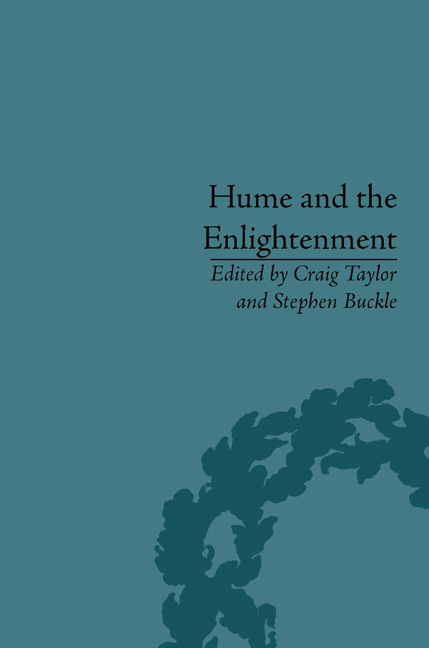Book contents
- Frontmatter
- CONTENTS
- Acknowledgements
- List of Contributors
- Abbreviations
- Introduction: Hume and his Intellectual Legacy
- 1 Hume and the Enlightenment
- 2 Will the Real Enlightenment Historian Please Stand Up? Catharine Macaulay versus David Hume
- 3 Philosophy, Historiography and the Enlightenment: A Response to Green
- 4 Hume's Enlightenment Aesthetics and Philosophy of Mathematics
- 5 Part 9 of Hume's Dialogues and ‘The Accurate Philosophical Turn of Cleanthes
- 6 ‘Strange Lengths’: Hume and Satire in the Dialogues Concerning Natural Religion
- 7 A Modern Malignant Demon? Hume's Scepticism with regard to Reason (Partly) Vindicated
- 8 Hume on Sympathy and Cruelty
- 9 Hume's Natural History of Justice
- 10 Hume and Rawls on the Stability of a Society's System of Justice
- 11 Can Hume's Impressions of Reflection Represent?
- 12 Mechanism and Thought Formation: Hume's Emancipatory Scepticism
- Notes
- Works Cited
- Index
2 - Will the Real Enlightenment Historian Please Stand Up? Catharine Macaulay versus David Hume
- Frontmatter
- CONTENTS
- Acknowledgements
- List of Contributors
- Abbreviations
- Introduction: Hume and his Intellectual Legacy
- 1 Hume and the Enlightenment
- 2 Will the Real Enlightenment Historian Please Stand Up? Catharine Macaulay versus David Hume
- 3 Philosophy, Historiography and the Enlightenment: A Response to Green
- 4 Hume's Enlightenment Aesthetics and Philosophy of Mathematics
- 5 Part 9 of Hume's Dialogues and ‘The Accurate Philosophical Turn of Cleanthes
- 6 ‘Strange Lengths’: Hume and Satire in the Dialogues Concerning Natural Religion
- 7 A Modern Malignant Demon? Hume's Scepticism with regard to Reason (Partly) Vindicated
- 8 Hume on Sympathy and Cruelty
- 9 Hume's Natural History of Justice
- 10 Hume and Rawls on the Stability of a Society's System of Justice
- 11 Can Hume's Impressions of Reflection Represent?
- 12 Mechanism and Thought Formation: Hume's Emancipatory Scepticism
- Notes
- Works Cited
- Index
Summary
In his discussion of David Hume's Enquiry concerning Human Understanding called Hume's Enlightenment Tract, Stephen Buckle sets out to show that Hume is a philosopher of the Enlightenment. More precisely, Buckle claims that Hume is not a radical sceptic, but his employment of forms of ancient scepticism ‘reflects the characteristic Enlightenment strategy of appealing to ancient schools of thought opposed to Aristotle in order to attack scholastic philosophy and its religious truths’. This claim implies a negative and somewhat sceptical conception of the meaning of enlightenment. But is such an orientation sufficient to count as a ‘philosopher of the Enlightenment?’ In this paper I do two things. First, I question whether this form of sceptical orientation suffices for being considered an Enlightenment philosopher. The limits of such an orientation emerge, in particular, when one turns to the consequences of this orientation for Hume the political theorist and historian. Second, I argue that it is rather in the history and philosophy of Hume's opponent, Catharine Macaulay that one finds a genuine Enlightenment philosophy. The first of these claims may rest on a quibble over the answer to the question, ‘What is the Enlightenment?’ But it is an important quibble. If, as I will argue, the Enlightenment consisted fundamentally in the establishment of the development of the idea that individuals have political rights, which underpins the growth, during the nineteenth century, of democratic forms of government, then Hume is not a philosopher of the Enlightenment.
- Type
- Chapter
- Information
- Hume and the Enlightenment , pp. 39 - 52Publisher: Pickering & ChattoFirst published in: 2014

